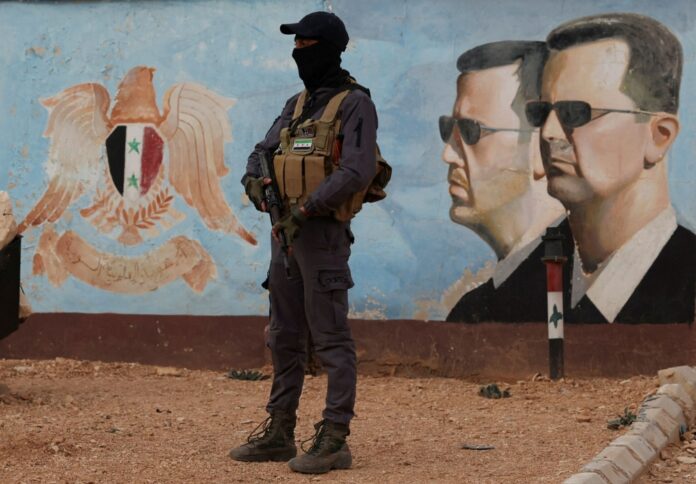BEIRUT, Feb 1 — Former allies and self-declared enemies of Syria’s ousted president Bashar al-Assad are flooding the country’s digital space with disinformation aimed at destabilising the fragile new order by sparking sectarian strife, analysts say.
During Syria’s civil war, opposing forces weaponised cyberspace to try to influence the conflict. Now there are fears online disinformation is derailing the transition of power after Sunni Islamist rebels defeated Assad in December.
Both domestic and foreign actors, including from Russia, China, Iran and Israel are believed to be involved in online disinformation and “weaponising narratives”, analysts say.
“One of the main issues impacting social cohesion is disinformation,” Bassam Alahmad, CEO of Syrians for Truth and Justice, told the Thomson Reuters Foundation.
Disinformation has become a “tool for instability”, and is creating tensions between communities across Syria, he said. “It is harming people no less than weapons.”
Assad, from the minority Alawite sect, was ousted by insurgent forces led by the Sunni Islamist Hayat Tahrir al-Sham (HTS), previously affiliated with al Qaeda and designated a terrorist organisation by the United States and United Nations.
HTS cut ties to al Qaeda in 2016 and has vowed to protect religious minorities since taking power.
But religious tensions remain high and foreign actors, including from Assad’s former allies Iran and Russia, as well as China and Israel, are believed to be stoking fears online.
Iranian, Russian, Israeli and Chinese officials did not respond to a request for comment.
“Sophisticated campaigns, often orchestrated by geopolitical players like the pro-Assad regime, Iran and China exploit digital platforms to manipulate narratives, divide communities, and undermine democratic efforts,” said Zouhir Al-Shimale, communications director at independent fact-checker Verify Syria.
“Disinformation in Syria spreads through coordinated digital influence campaigns leveraging social media platforms, fake profiles, bots and AI-generated personas,” he said.
One widely shared video showed a fire in an Alawite shrine in the city of Aleppo. Many believed the video illustrated the threat to Alawites, and its release late last year coincided with the most widespread unrest since Assad’s fall.
There were protests in the city of Homs that residents said were led by minority Alawites and Shi’ites, and also by Syria’s coast, where most of the country’s Alawite minority live.
In the port city of Tartous, 14 police were killed in an ambush authorities blamed on forces loyal to Assad.
But the Interior Ministry said the video predated the HTS capture of Damascus and whoever was behind it was intent on inciting sectarian strife.
Al-Shimale said the video was a success for disinformation campaigns.
“The disinformation network remains active and is expanding, making it likely to resurface with similar claims designed to provoke unrest,” he said.
WhatsApp, China
Ruslan Trad, a researcher at the Atlantic Council’s Digital Forensics Lab said Assad loyalists were “waging a war of information” on WhatsApp, which is immensely popular in Syria.
“Unverified reports from Syria are still shared in sizable group chats and channels, creating the impression of anarchy,” Trad said.
Disinformation on Syria is also part of a wider geopolitical battle with online accounts linked to China seeking to use the fall of Assad to promote their own narrative, said Jack Stubbs, chief intelligence officer at social media researchers Graphika.
“These accounts leveraged events in the Middle East and Syria to push anti-U.S. narratives, such as claiming that ‘American democracy’ destroyed Syria, and amplify anti-Israel sentiments — a key narrative for both covert and overt Chinese influence actors,” he said.
But, he said, the exercise “failed to break out of the operation’s own echo chamber and garner significant engagement from authentic users.”
Online campaigns prey on Syrian fears post-Assad, especially those of minorities, said Andreas Krieg, associate professor at King’s College London.
He said disinformation was easy to disprove, but the danger lay in the way online actors twisted events to push an agenda.
“It’s the weaponised narratives more than disinformation. It’s the way that external actors can stoke fears and mobilise communities against a potential new consensus in Syria,” Krieg told the Thomson Reuters Foundation.
Krieg said he saw this play out when Israeli troops moved into the Syrian side of the Golan Heights, a demilitarised zone that straddles the border between the two countries mainly inhabited by the Druze religious minority.
Soon after, accounts supporting Israel and Israeli Prime Minister Benjamin Netanyahu circulated a video showing a local figure addressing a gathering in the Golan Heights and calling for Israel’s protection.
Krieg said the footage was of a “fringe opinion of a fringe figure”, but it was used by pro-Israeli networks to say “oh, actually, the Druze want to be protected by the Israelis”.
Russia, Iran and Israel have been the “the main drivers of pushing particular narratives,” he added.
The perception in Syria that local media are biased also means online disinformation is more likely to take hold.
Political interference and a lack of transparency hinder Syria’s local media outlets from combating disinformation, said Alahmad.
“They don’t publish the truth, they publish propaganda,” he said, adding that many journalists fear violence if they report freely.
“We need this minority of independent media activists; they should be the majority,” Alahmad said. “There should be capacity building so people can focus on truth, nothing except the truth: this is what we need.” — Reuters


